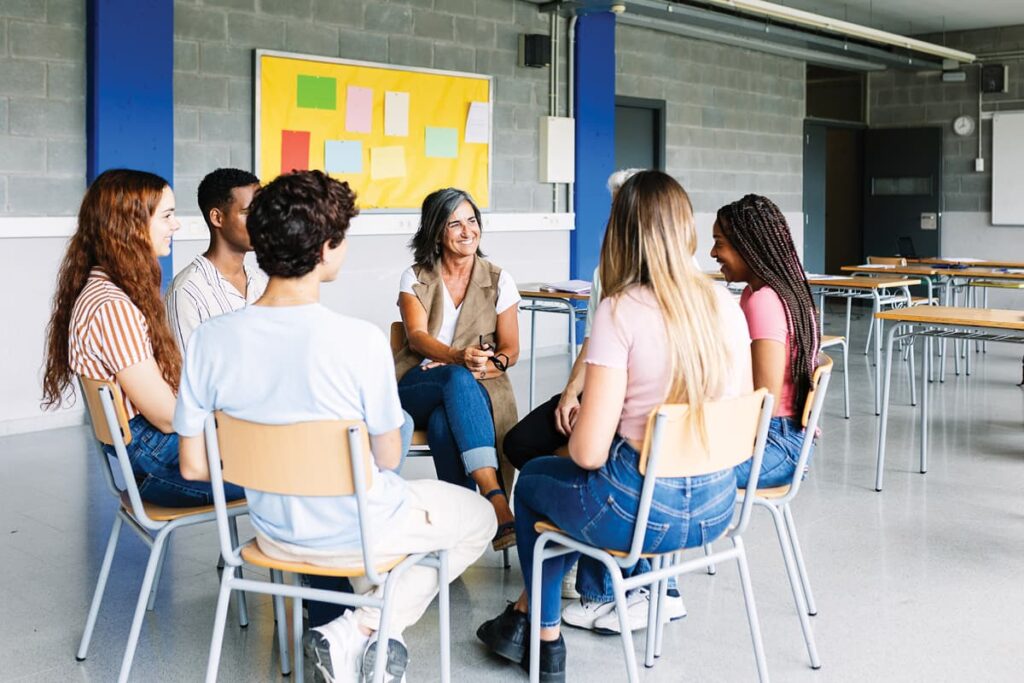School-wide Social and Emotional Learning (SEL)
Because students model what they see, the most important social emotional development and learning begins with the adults in a school. Given this, it’s important to ask— do the adults in your school model self-awareness, self-management, growing social awareness, build healthy relationships, and exhibit responsible decision-making throughout the learning environment and school day?
For example, if an adult makes a mistake and scolds the wrong student, does the adult own up to it and sincerely apologize for making a mistake, or do they brush it off? Do adults at your school share appropriately about their lives and experiences to build positive relationships with colleagues as well as students? Do all adults speak about their own emotions and talk about their feelings about things with students so students understand it’s okay to express feelings in a school setting?
If adults in your school do this regularly, then the culture of your school will benefit, and this will be reflected in your students’ ability to take ownership of their own social and emotional learning. To ensure students manage their own SEL skills, it’s not enough to teach them lessons and provide them with strategies; these behaviors must be clear in the interactions between adults within the institution and within the implementation of adult SEL.
Teachers have been told they are the most important element in the ability of a child to learn. When it comes to a student’s ability to learn and access social-emotional learning, this is true of every adult in a school.
I use the term adults and not teachers because each adult working at a school affects students in some way: consider a school’s front office clerks who assist students when they walk in the first day of school with a question; the attendance office clerk who speaks to tardy students; the school security attendant who guides students to make better choices during free periods; and the cadre of other professionals who serve the needs of students and the running of a school. These adults have interactions with students on a day-to-day basis and also offer opportunities for healthy SEL interactions.
One Solution to Adult SEL: Staff Wellness Days
One way my multi-track school has worked on the issue of social emotional learning for adults is by creating staff wellness days. While we have not found a way to incorporate all of the adults on campus yet, this past year we found productive ways to engage with teachers, administrators, and educational assistants.
Because we are a multi-track school, only three tracks are on campus at any given time, which means the entire teaching staff is rarely on campus at the same time. These staff wellness days are one of the few times the faculty are all on campus together.
A staff wellness day is scheduled once a quarter, runs for about 90 minutes, and is led by staff members. Staff members sign up to lead various adult SEL activities such as tennis, volleyball, yoga, circuit training, dance, bullet journaling, cooking, baking, lei-making, essential oils, karaoke sessions, and so on.
Wellness Day Logistics
The beauty of staff wellness days for adult social emotional learning, is each educator is able to share their talents. This is how they are organized:
- An email is sent out about 3-4 weeks before each wellness day, which occurs once a quarter.
- The email asks for staff members, if they are willing, to lead a session. Staff members reply with an activity they would like to lead.
- Once all the sessions are set, the rest of the staff are given a selection of 8 or so sessions to sign-up for.
It’s not just teachers who lead wellness day sessions; educational assistants, assistant principals, and the principal have all shared their talents and SEL strategies for adults.
Why It’s Important
Wellness Days serve to give educators space and time to engage with one another in a relaxed and fun environment. These non-work sessions allow adults time to chat about common interests and see their colleagues in a new way. Relationships are built and forged by doing new things together.
For instance, when two adults learn how to bullet journal for the first time, they may both struggle with the concept of a future log or the difference between an event and a task. As they talk through their confusion, they will eventually arrive at an answer by discussing it or asking the person leading the session. Finding this information together, and finally understanding it together, creates a new bond.
One of the most difficult things to do in any organization is to build authentic relationships. Making mistakes, laughing, and learning together in a low-stakes task provides this opportunity.
To discover how Rethink SEL Professional Learning empowers the adults in a school with the tools and strategies they need to create positive school climates in which all students can thrive, visit our SEL Professional Development page, or request a demo today.




